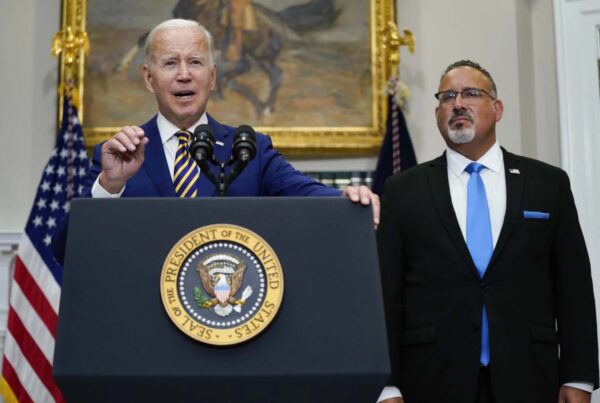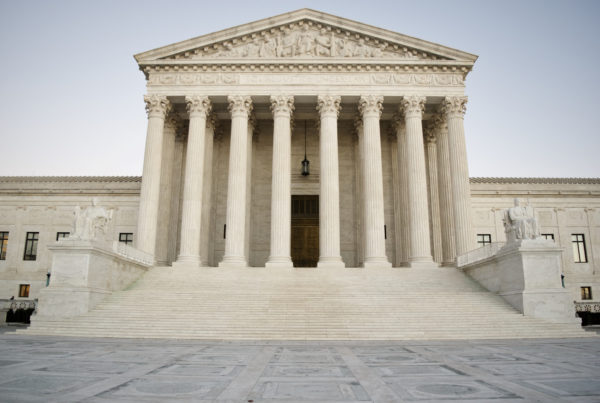In 1990, there were around 15,000 banks here in the United States. Today, there are just 4,000 banks nationwide.
That’s according to new research published by the progressive American Economic Liberties Project. They’re out with a new policy brief advocating against the consolidation of the banking industry.
Shahid Naeem is a policy analyst with the think tank who authored the report. He joined Texas Standard to talk about how the banking industry became so consolidated. Listen to the interview above or read the transcript below.
This transcript has been edited lightly for clarity:
Texas Standard: The headline finding of your report is that the United States has lost thousands of banks over the past few decades. How did we get here and why does this matter?
Shahid Naeem: Well, those are two really good questions. You know, as you mentioned, the U.S. used to have a really large and diverse foundation of a banking industry. And really that started to change in the eighties when we started to deregulate our banking system and allow banks to buy each other in different states. We then allowed banks to, you know, enter different types of businesses to combine with insurance firms.
And really, that’s led to what we see today, which are a handful of enormous financial firms controlling really the majority of the entire banking system. Today, the top six firms in the U.S. that do banking controlled more assets than every other bank and holding company combined. And it’s fueling a lot of consolidation in the middle with the regional banks that we’ve seen struggle a little bit this year with some of those failures, and at the local level, where these smaller banks are getting a little left behind trying to bulk up to compete with the JPMorgans and Citigroups of the world.
Well, you mentioned there’s been a lot of consolidation of regional banks. Is that happening here in Texas?
Yeah, actually, that’s a great question. So I think one of the best examples of this is in 2021, Houston-headquartered Cadence merged with BancorpSouth and created a $50 billion banking giant. Last year, I think Texas had the second most bank mergers of any state. So these issues really affect everyone across the country, and Texas is no exception.
Over the past few years, we’ve seen the Federal Trade Commission (FTC) and Department of Justice come out a lot stronger, blocking big company mergers. Have we seen that in the banking industry?
So the banking industry is a little bit different than any other industry.
We have separate statutes for bank mergers. And really, there’s a kind of complicated web of regulators that enforce bank merger policy. There are multiple different federal banking regulators, along with the DOJ, that have authority in the bank merger space.
What we’ve seen recently in the past couple of decades is we’ve seen the DOJ really defer its authority to these federal banking regulators. And the federal banking agencies have been quite lax in their approach to enforcing competition and enforcing the bank merger statutes.
So last week, actually, the Department of Justice put out a big signal and really kind of put the banking industry on notice that they are going to start enforcing their statutory mandate to keep antitrust policy at the forefront of banking merger policy. And hopefully that spurs the federal banking agencies to do the same.
Your research points out that banking is heavily concentrated – with the biggest banks like JPMorgan Chase and Bank of America dominating the industry. If you’re calling for more regulation of banks, how do you determine when a bank has gotten too big?
That’s a great question. So there’s a lot of discussion around this, both in banking but also in the banking regulator space. And I think many folks understand, especially after 2008, that having these enormous firms that are really complex and interconnected, they’re critical parts of the economy. And so their failures, obviously as we saw in 2008, can have incredible shocks.
The other thing is when we have banks getting this big and this powerful, a lot of the times they’re doing it through acquisitions and when they get this big and they grow this fast, opportunities for negative impacts on the economy as a whole really start to magnify.
Well, the American Economic Liberties Project says the banking industry has become too concentrated. So what’s the way out of this as you see it?
So I think there’s a couple of steps that we can look at.
The first thing that one can do is stop facilitating more consolidation. So taking the industry as it is and saying “we don’t need to be facilitating more and more bank mergers” – and we’re starting to see some movement in policy on those terms.
The other thing is that federal regulators also have the power to shrink and to simplify firms that are too big to manage and too big to fail.
So if we if we look at the landscape of our financial ecosystem, federal regulators do have the authority for banks that are too big and too powerful to, you know, shrink them and simplify them and make them sell off their divisions – make them simplify their operations so that in the event of a failure, they can be resolved more easily.
Now, you’ve mentioned that the top six biggest banks have more assets than all the other banks combined. Would you go so far as to call for the government to break up those financial institutions?
This is actually something that really has been bubbling on the surface. You know, people in Congress, people who understand this issue, folks really are looking at these large institutions and wondering how useful it is to have the entire economy kind of in thrall to these really large firms.
And the concerns around financial stability are one thing. But also a really big element of this is that when firms are this large, they can really get away with a lot of things that smaller banks can’t.
So if you look at, for example, Wells Fargo, which has been fined I think more than $20 billion just since 2008 for abusing its customers – folks have lost homes, their cars, their jobs. And still today, one in three American households banks with Wells Fargo. And simply because they’re so large and they have so much market power, what we see is really a lack of accountability. And those fines, those may be written off as the cost of doing business if you have billions and billions in your coffers.
But it also allows these firms and these big banks to get away with things that other smaller banks can’t. So there really are a number of consequences to having firms that are this large control the financial system. And so that’s really something that has been called for as we look at the future of banking and we look at what we want the future of our economy to look like.













